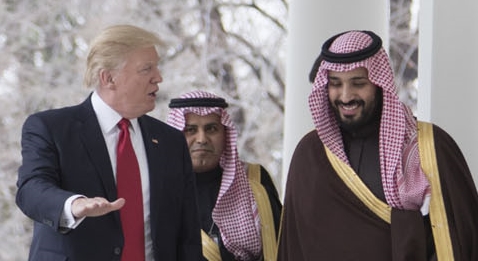Saudi Arabia pursues nuclear technology
March 31, 2019 | Expert Insights

The US secretly approves preliminary measures to share nuclear technology with Saudi Arabia, despite domestic and international concerns.
Background
The Kingdom of Saudi Arabia is one of the most powerful powers of the Arab world. It is an oil-dependent nation with the second-largest proven petroleum reserves and is the largest exporter of the fuel. It is the largest economy in the Arab world and the ruling Al Saud dynasty holds a monopoly on political, economic and military power. Saudi Arabia is currently ruled by King Salman, although true power is thought to lie with the crown prince, Mohammad bin Salman.
The Kingdom has oil reserves did much to increase its prominence and geopolitical power. However, fluctuating oil prices, steadily declining reserves and environmental concerns, has led to the country to seek divestment from oil.
The Islamic Republic of Iran is a Shi’ite country that is Saudi Arabia’s largest normative, political and military rival in the region. Iran has consistently sought nuclear weapons in order to secure a deterrence against what it believes are existential threats surrounding it. While Iran has yet to completely weaponise its nuclear platform, Iran already possesses conventional capabilities to strike regional targets, such as those in Saudi Arabia. If Iran were to successfully weaponise, it would possess delivery capabilities.
Despite the differences between the two countries, Saudi Arabia, an ultraconservative Islamic absolute monarchy, and the US, a secular, constitutional republic have been close military and economic partners. Saudi Arabia has relied on the US for high-quality arms, while the US has maintained ties with the Islamic country for economic gain and for its energy requirements.
Analysis
A recent document stating that US Energy Secretary Rick Perry has secretly given approval to US companies to sell nuclear power technology and provide related assistance to Saudi Arabia shows that the Trump administration is actively engaging with Saudi Arabia over nuclear technology. The Kingdom intends to build at least two nuclear power plants, with the US, South Korea and Russia in competition for related deals. Mr. Perry’s Part 810 authorisations permit companies to conduct preliminary work relating to nuclear power before a deal is secured. No equipment would be shipped under the authorisations.
The Department of Energy’s National Nuclear Security Administration (NNSA) said in the document, “each of the companies which received a specific authorisation for (Saudi Arabia) have provided us written request that their authorisation be withheld from public release.” Withholding the authorisation from public view is against the typical modus operandi for the Energy Department. Despite staying that the request went through normal multi-agency approvals, the reason for secrecy is aimed at keep criticism of the Trump administration over nuclear ties to Saudi Arabia at bay.
Crown Prince Mohammed bin Salman stated that the Kingdom would develop nuclear weapons if Iran did. US regulations thwart clandestine efforts to create fissile material for nuclear weapons, including those restricting enriching uranium and the reprocessing of spent fuel; the Kingdom has resisted these regulations. Recent events between Iran and the US has led to the suspension of the Joint Comprehensive Plan of Action (JCPOA) that restricted Iran’s capability to secure nuclear weapons. Iran was estimated to be able to weaponise in a matter of months before the JCPOA went into effect. The move to secretly share nuclear technology comes to send a message to Iran that the JCPOA is dead and Saudi Arabia could soon serve as the regional deterrent to a nuclear Iran.
Counterpoint
However, it is unlikely the US is actively seeking nuclear proliferation in the Middle East. Israel, another staunch US ally, possesses the capability to build nuclear weapons as a deterrent to Iran. Simultaneously, this analysis presents Saudi Arabia as seeking nuclear technology for peaceful purposes, which it needs. However, some rogue actors such as Abdul Qadeer Khan, father of Pakistan’s nuclear weapons, have actively sought nuclear proliferation. Pakistan’s close relationship with the Kingdom is of particular concern here should the Arab state seek a clandestine nuclear operation.
Assessment
Our assessment is that while the US has regulations in place to ensure a clandestine nuclear weapons program is near-impossible, the secrecy surrounding the authorisations makes the entire transaction suspect. We believe that Saudi Arabia seeks nuclear technology to ensure its safety from Iran, with the added pretext of divesting its energy sources from oil. We also believe that the US does not intend the proliferation of nuclear technology, although Saudi Arabia may not have the same objectives.








Comments